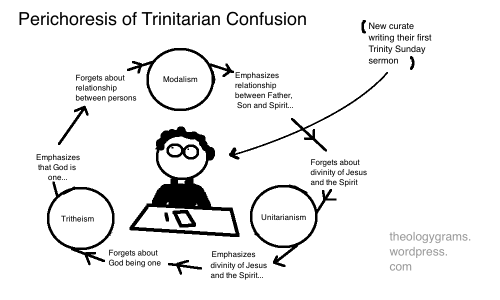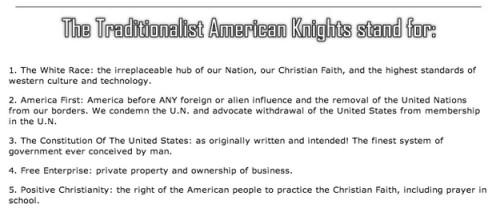Dealing with various creationists, you quickly begin to recognize the different popular flavors out there.
The Intelligent Design creationists believe in argument from pseudoscientific assertion; “No natural process can produce complex specified information, other than Design,” they will thunder at you, and point to books by people with Ph.D.s and try to tell you they are scientific. They aren’t. Their central premise is false, and trivially so.
Followers of Eric Hovind I find are the most repellently ignorant of the bunch. They love that presuppositional apologetics wankery: presuppose god exists, therefore god exists. It’s like debating a particularly smug solipsist — don’t bother.
The most popular approach I’ve found, though, is the one that Ken Ham pushes. It’s got that delightful combination of arrogant pretense in which the Bible-walloper gets to pretend he understands better than scientists, and simultaneously allows them to deny every scientific observation, ever. This is the argument where they declare what kinds of science there are, and evolutionary biologists are using the weak kind, historical science, while creationists are only using the strong kind, observational science. They use the distinction wrongly and without any understanding of how science works, and they inappropriately claim that they’re doing any kind of science at all.
A recent example of this behavior comes from Whirled Nut Daily, where I’m getting double-teamed by Ray Comfort and Ken Ham (don’t worry, I’m undaunted by the prospect of being ganged up on by clowns.)
According to Ken Ham’s blog at Answers in Genesis, Minnesota professor PZ Myers, who was interviewed by Comfort, said: “Lie harder, little man … Ray Comfort is pushing his new creationist movie with a lie. … What actually happened is that I briefly discussed the evidence for evolution – genetics and molecular biology of fish, transitional fossils, known phylogenies relating extant groups, and experimental work on bacterial evolution in the lab, and Ray comfort simply denied it all – the bacteria were still bacteria, the fish were still fish.”
But Ham explained that Comfort “asks a question something like this: ‘Is there scientific evidence – observable evidence – to support evolution?’ Well, none of them could provide anything remotely scientific. Oh, they give the usual examples about changes in bacteria, different species of fish (like stickleback fish) and, as to be expected, Darwin’s finches. But as Ray points out over and over again in ‘Evolution vs. God,’ the bacteria are still bacteria, the fish are still fish, and the finches are still finches!”
Isn’t that what I said? I gave him evidence, which he denied by falling back on a typological fallacy: the bacteria are still bacteria. What he refuses to recognize is that they were quantitatively different bacteria, physiologically and genetically. To say that something is still X, where X is an incredibly large and diverse group like fish and bacteria, is to deny variation and diversity, observable properties of the natural world which are the fundamental bedrock of evolutionary theory.
But the giveaway is that brief phrase “scientific evidence — observational evidence”. That’s where the real sleight of hand occurs: both Comfort and Ham try to claim that that all the evidence for evolution doesn’t count, because it’s not “observational”. “Were you there?” they ask, meaning that the only evidence they’ll accept is one where an eyewitness sees a complete transformation of one species to another. That is, they want the least reliable kind of evidence, for phenomena that are not visual. They’re freakin’ lying fools.
All scientific evidence is observational, but not in the naive sense that all that counts is what you see with your eyes. There is a sense in which some science is regarded as historical, but it’s not used in the way creationists do; it does not refer to science that describes events in the past.
Maybe some examples will make that clearer.
We can reconstruct the evolutionary history of fruit flies. We do this by observation. That does not mean we watch different species of fruit flies speciate before our eyes (although it has been found to occur in reasonable spans of time in the lab and the wild), it means we extract and analyze information from extant species — we take invisible genetic properties of the flies’ genomes and turn them into tables of data and strings of publishable code. We observe patterns in their genetics that allow us to determine patterns of historical change. Observation and history are intertwined. To deny the history is to deny the observations.
Paleontology is often labeled a historical science, but it doesn’t have the pejorative sense in which creationists use it, and it is definitely founded in observation. For instance, plesiosaurs: do you think scientists just invented them? No. We found their bones — we observed their remains imbedded in rock — and further, we found evidence of a long history of variation and diversity. The sense in which the study of plesiosaurs is historical is that they’re all extinct, so there are no extant forms to examine, but it is still soundly based on observation. Paleontology may be largely historical, but it is still a legitimate science built on observation, measurement, and even prediction, and it also relies heavily on analysis of extant processes in geology, physics, and biology.
The reliance on falsehoods like this bizarre distinction between observational and historical science that the Hamites and Comfortians constantly make is one of the reasons you all ought to appreciate my saintly forebearance, because every time I hear them make it, I feel a most uncivilized urge to strangle someone. I suppress it every time, though: I just tell myself it’s not their fault their brains were poisoned by Jesus.


























